Text
A Pitch for Podcasting
By Hilary Brueck
When I turn on music podcasts, it's usually to discover new sounds, hear some different artists and maybe listen to some acoustic renditions of old favorite tunes.
So when Alex Kapelman and Whitney Jones, producers of “Pitch” podcast had me listen to their show, I was expecting to hear about the sounds and the rhythms of music.
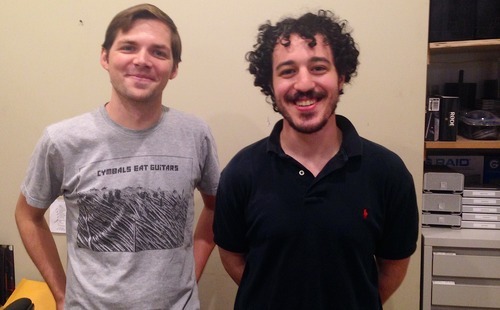
But what I noticed and admired right off the bat about Pitch was how the duo talks about the stories behind music: they're not just listening to music, they're digging into long lost loves and voter registration issues!
It's all part of a bigger exploration of the connection between music and the people living around it, a concept called “music ecology,” or bringing the human experience into the story of music.
Pitch is rolling out their second season of shows this month (with a first-ever karaoke-themed episode set to debut tomorrow). If you've ever wondered how to work with sound design, how to make your tiny podcast go viral, or even, if you're just looking for that next great podcast to add to your library, check out our conversation and head over to www.hearpitch.org for the latest episodes of Pitch.
0 notes
Text
How to Talk to Aliens
By Hilary Brueck
Radio has the ability to capture a single moment — a single picture, sound, or memory — forever. The sounds and images broadcast via radio waves are reaching not only deep into earth-dwelling archives, but also the darkest corners of space.
"Radio is eternal," says science journalist and Columbia colleague Bill Rutherford. "These things go on forever." Listen below to learn what makes radio waves so eternally powerful and solar-system permeating:
After our interview, I couldn't help but wonder, what's going to happen to the potential for intergalactic correspondence when radio waves are completely wiped out by newer digital formats: are aliens going to be missing out on their daily dose of the latest earthling news?
0 notes
Text
"Stay earbudded," Mike Pesca tells listeners on inaugural "The Gist" podcast.
By Matt Collette

(You really aren't "tuning in" to a podcast, after all. There aren't any radio waves involved.)
Mike Pesca, formerly of NPR, launched his new podcast, The Gist, yesterday on Slate. It featured an interview with Slate's legal correspondent Dahlia Lithwick, a chat between Pesca and Radiolab host Jad Abumrad, and the "The Spiel," a Seinfeld-esque segment where Pesca winds up talking about pretty much everything.
Podcasts are a big deal for Slate, which already has a whole bunch of weekly shows. (These include a whole bunch of "Gabfests" and the sports show "Hang Up and Listen.") This is new territory for the site, though, because it's essentially a drive-time radio show. That means audiences are getting a show designed for that day, not that week.
That requires a change of habits — or at least some tweaks to auto-download settings. It's an afternoon show, so if you're downloading it the next day, you're already behind.
Here's how Slate describes the show:
The show is designed to be the perfect companion for your evening routine, whether you’re commuting home, making dinner, working out at the gym, or getting ready for an evening out. In about 20 to 25 minutes, we’ll arm you with the information you need about the day’s most interesting stories, and shed light on some stories that haven’t made it into your social media streams yet.
Pesca's got a big personality, so Slate seems like perhaps a more appropriate home for him than the oft-staid NPR mothership. And though he's a sports guy, the show won't be all sports. Just "the stuff we can't ignore," he tells Abumrad, who's frankly shocked at the idea of a daily radio show.
Check out the first episode:
I know I'll be listening to this on pretty much every evening subway commute.
0 notes
Text
Don't Shush Me, Madam Librarian: a Library Lover's Introduction to the NYPL's Archive of Recorded Sound
By Hilary Brueck
My love for the New York Public Library blossomed young.
When I was little, I used to read this book, "Hilary and the Lions:"
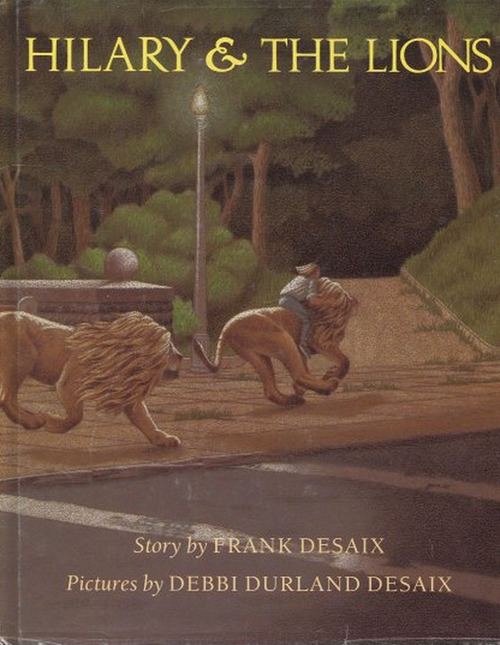
The book's a classic children's story. It's a midnight adventure: bounding majestic library guard lions, "Patience" and "Fortitude" in their flowing manes escort Hilary through the streets and quiet moonlit parks of New York City. How could I not love the library after being introduced like that?

I still love almost everything about the Midtown Mecca. The NY Public Library is a sanctuary where students, scholars, book-writers, tourists and the homeless meet. They can worship storied authors, use the restroom and sit in silence. Yes, going to the library is a religious experience.
But, just like church, the problem with the library (for a reporter, anyway) is that it's usually really... quiet.
Last week, the library got a tad noisier, showcasing their Rogers and Hammerstein Archive of Recorded Sound for "Preservation Week."
Archivists explained how they digitize old sounds, keeping them playable and alive. I was ecstatic to learn that the library not only embraces sound, but actually houses 600,000 volumes of commercial music, rare recordings and even some spoken word.
If you're curious about how sound recording has evolved through the ages, check out this YouTube video the archivists over at NYPL shot, featuring lots of the machines they still use to play back old tapes and cylinders today.
2 notes
·
View notes
Text
WNYC's Manoush Zomorodi talks women in radio, podcasting, and why she loves neurotic hosts.
By Hilary Brueck
Here at the Radiofile, we're big New Tech City fans. Maybe that's because (full disclosure) Matt's also an intern at WNYC, but I'd like to think it's more because every week they bring us funky new tech stories.
A recent favorite of mine was this segment about why more women are gravitating to computer science (and how that's great for the economy).

New Tech Host Manoush Zomorodi has a very upbeat, cinematic (and unmistakable) radio voice. So when Manoush agreed to sit down and chat, I couldn't wait to ask about the changing role of women's voices on the radio.
I was delighted when our candid conversation also steered to the virtues of "weird, strange and unusual" podcasting, being a neurotic host, and, last but not least, why being called a bitch in your comments section should sometimes be considered a badge of honor.
0 notes
Text
Bringing Buzzfeed — or at least its mindset — to NPR
By Matt Collette
The Nieman Journalism Lab at Harvard has a story today about how a young NPR staffer, Melody Joy Kramer, created a framework for NPR staffers to think about their analytics. It's a tool for everyone, from the web team and executives who already follow these numbers to reporters and editors in the newsroom.
It's the kind of tool that's commonplace in modern, web-first newsrooms, like Gawker and Buzzfeed. But Kramer said it's been harder to implement in legacy media organizations:
If you start out at a new media startup, it’s easy to say that analytics tools are part of your culture from the ground up. It’s a little harder at shops like my own, where there’s already a culture in place.
The thing began small, starting with a daily email to staff about top stories. That soon grew into a suite of analytics tools developed after visits to other newsrooms, including Buzzfeed, the Huffington Post, and the New York Times. The most important takeaway was that all data is relative.
“We know a politics story isn’t going to do as well as a pop culture story necessarily, so how do we create a measure that allows us to see success for what it is,” said Wright Bryan, another staffer on NPR's social media desk.
Even more impressive? The whole thing came together in six weeks.
1 note
·
View note
Text
#NowHearThis: Once Upon A Time
By Veronica Jean Seltzer
We realized that we've been neglecting our neighbors across the pond! So for today's Now Hear This we bring you the BBC's From Our Own Correspondent.
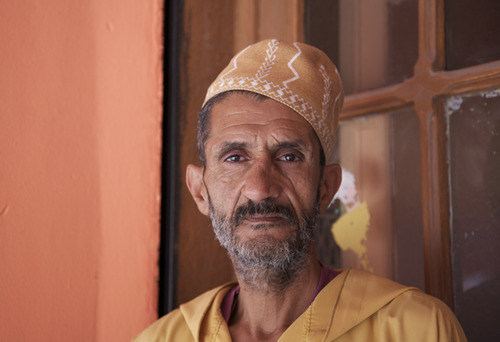
Reporter Richard Hamilton took a trip back to his old post in Marrakech to tell the tale of Morocco's fading traditional storytelling.
The story begins at 22:54.
Now, full disclosure, I'm a little biased because I have lived and reported in Morocco myself, but Hamilton captures the place very well. His descriptions sound like they could come right from the storyteller:
Dating back to the days of the French protectorate, it sometimes feels as if its decor and staff haven't changed since then either. Wobbly ceiling fans rotate languidly trying to dispel the stifling heat. Portraits of King Mohammed the VI hang at odd angles from its blue and white tiled walls.
This made me think of an interesting irony: Hamilton's piece discusses the disappearing art of oral storytelling…using a potentially disappearing style of radio storytelling. His story has no diversity of sound in it. It's just Hamilton. He gives us quotes from his main character, but Hamilton voices them rather than letting us hear the character's voice. Morocco is such a sound rich place, but we don't get to hear it.
I still found the story engaging, but it sounded a little anachronistic. I'm not sure this narration-heavy style lends itself to modern radio. Would someone commuting or surfing the web continue listening to this piece?
What’s the best thing you heard today? Submit your own #NowHearThis via Facebook,Twitter, or email.
0 notes
Text
#NowHearThis: Over 100 years of burying on Hart Island
By Hilary Brueck
I love hearing stories on the radio that tell me about something I never knew existed. If that thing happens to be a forbidden island, bonus points.
So when fellow Uptown Radio reporter Chris Mathias headed out to Hart Island on last Friday's show, my ears perked up.

New York has been burying dead on Hart Island since the Civil War. Today, it's a potter's field for stillborn babies and "unclaimed" dead —mostly the homeless. Prisoners from Riker's Island serve as the gravediggers; that's why visits are restricted by the corrections department.
I love this story because you travel with Chris to the island, to hear the sounds as an insider. And the insights of a grieving mother visiting her child's grave make a current city council battle over park status for the island come alive. The story is a peak inside an unexplored corner of the city, a rare journey with a trustworthy narrator... and a few prisoners too.
0 notes
Text
Public radio goes bananas
By Matt Collette

Public radio has a thing for bananas. Seriously. It's weird.
The banana is a fascinating fruit, yes. The bananas we eat today are a totally different species from the ones our grandparents and great-grandparents ate. That type of banana was hit hard by a particularly brutal banana-killing disease, prompting global shortages. (Not a joke: That's why we have the song, "Yes We Have No Bananas," which was written just because everyone was all out of bananas.)
Today's bananas, a species called the Cavendish, are actually all genetically identical, leaving them particularly vulnerable to another mass extinction. And public radio loves to tell this story. Take this story from PRI's Living on Earth, which just went up today. Or this story, from February.
Or a Weekend Edition piece from 2012. Or back-to-back segments on Fresh Air and Talk of the Nation in July and August of 2011. And these are just the segments and stories I remember.
I think it's the equivalent of a go-to dinner party anecdote. It's a fun story about something that seems so completely normal. But if you keep telling the same story, we're going to start thinking you only have one story. (And when that one story is about bananas, that's just weird.)
0 notes
Photo
Twenty years ago, National Public Radio got the Internet. Now the 'R' doesn't even start for radio, and that all started here.

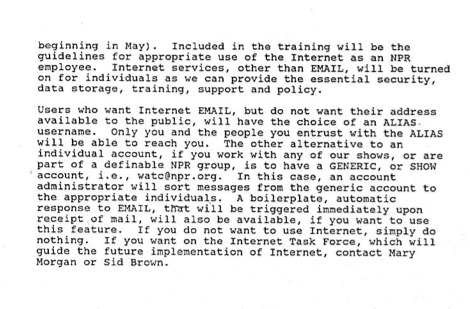
A memo from 20 years ago, today.
Key quote: “The internet is a collection of computer networks that is connected around the world…A code of ‘netiquette’ exists among users and within user groups, but otherwise, you pay your money, find your niche and take your chances.”
via Johnny Kauffman at NPR
2K notes
·
View notes
Text
#NowHearThis: Deborah Amos hits the slopes in Iran
By Hilary Brueck
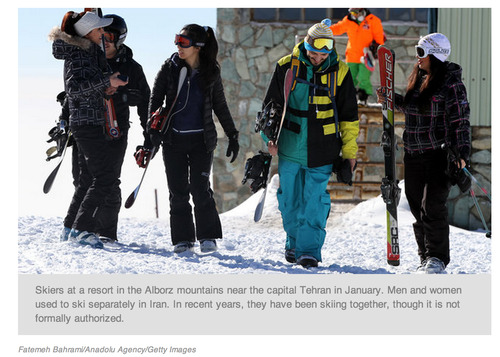
When Deborah Amos was issued a "surprise" visa to Iran last month, she jumped at the chance to go back to a country she hadn't reported from in 23 years.
So upon arrival, she went directly to the place that interested her the most, the place where the country's women were, quite literally, letting their hair down: the ski slopes.
"Iran's Culture Wars: who's winning these days?" is a lively portrayal of a country in defiance of it's own rules. It's a fresh look at the way the country is shifting: the contrast between the Iran of two decades ago and Iran in 2014.
When Amos came and visited my radio workshop last week at Columbia, she told us how her recent reporting experiences in Iran (including her short detainment by the local "morality" police) were driven by her own curiosity.
Because she didn't have time to prepare for interviews before leaving the U.S. or vet sources before she hit the ground in-country, she was able to speak to a different cache of people. She spent time in malls interviewing young women and she was able to spend an entire afternoon watching an Iranian filmmaker at work. In short, she had the chance to get a real feel for what life is like in the country today, to take the political temperature of the people who call Iran home, but who also like to wear their scarves loose and their pants tight.
What’s the best thing you heard today? Submit your own #NowHearThis via Facebook,Twitter, or email.
1 note
·
View note
Text
#NowHearThis: Memories of the New York World's Fair
By Matt Collette

(AP File Photo)
Fifty-one million people visited the 1964 World's Fair, a vision of the future that took over Flushing Meadows Corona Park. The massive Unisphere is one of the few remaining landmarks from the global showcase of technology and the future. It remains burned in the memory of scores of New Yorkers, particularly those who got to go as children.
Friday's Brian Lehrer Show, guest-hosted by New Tech City's Manoush Zomorodi, included fair historian Bill Young. Young said the World's Fair was a Cold War-era testament to American capitalism. Guest after guest called in with memories of the fair, which one called "the best thing I've ever seen."
The fair's long-closed New York Pavilion is open for three hours only next Tuesday, April 22nd from 11-2. Huge crowds are expected. This show is a tribute to a piece of New York history I've never experienced — and the kind of thing a lot of us may never actually get to see ourselves.
What’s the best thing you heard today? Submit your own #NowHearThis via Facebook,Twitter, or email.
0 notes
Text
Behind the scenes at WNYC's Sleep project
By Matt Collette
WNYC's Data News team is a couple weeks into an ambitious project where it's asking listeners to track and submit data about how they sleep. The data collected in Clock Your Sleep is being used to identify how New Yorkers sleep and informing story coverage at programs across the station.
We talked to one of the people behind the project, Jeanne Brooks, who's also co-founder and director of News Disruptors, which works to find new ways to incorporate data and technology into narrative storytelling. We asked her to tell us about the project's creation and where it's headed next.
What are you asking WNYC listeners to do with this project?
Why radio?
What's important about the act of data collection itself?
What's happening next to engage participants?
0 notes
Text
#NowHearThis: Google Glass may have to hit the road before it ever gets behind the wheel.
By Hilary Brueck

(WNYC-Tedeytan/flickr)
There's really no better way to start a busy day in New York City than with the sweet, soothing savvy of Soterious Johnson on WNYC. But this morning, I was especially excited to hear Soterious announcing our very own Matt Collette's latest story about Google Glass would be part of the day's NYC Morning Edition mix.
Check out all the scene setting Matt does in this story: he brings us right into the world of developers and tech geeks. We're in the bar with Launa Rich trying on Google Glass and wondering, how do you control this thing, anyway? Then we move on to the road, and into the car with Robert Sinclair, a AAA employee who's weary of people using more tech in the car.
I left the story curious for what's going to happen next. Will Google Glass prove to be the car-worthy tech of the future? Will wearable tech be applauded as a well-placed navigation device, or chastised as a demonic smartphone on steroids?
I guess we'll have to wait for Matt's next trip to the bar to find out.
What’s the best thing you heard today? Submit your own #NowHearThis via Facebook,Twitter, or email.
0 notes
Text
#NowHearThis: 1984
By Matt Collette
One of the breakout shows on the new Radiotopia platform is Benjamen Walker's The Theory of Everything. Each week it merges journalism, fiction, and whole lot more into one big package of nothing-else-like-it radio. And this week's might be the show's most ambitious installment.
The hour-long episode goes back to 1984 — "the year, not the book," as the podcast quickly points out. It merges diary entires and a massive quantity of archival sound to create something like an audio collage, something unlike anything I've ever heard before. Here's how Walker explains it:
In 1984 your host was twelve years old, and like George Orwell’s protagonist Winston Smith he kept a diary. Young Benjamen Walker was convinced that his 1984 had a lot in common with Orwell’s 1984, so he took notes and made recordings for you, the citizens of the future.
Like other installments of "The Theory of Everything," I'm not always sure where fact ends and fiction merges. But it's not a news show, per se, so I feel like that's totally OK.
I admit I'm probably not the target audience for this installment. I wasn't born until 1987, so most of the cultural references in "1984" are things I've come across secondhand. But it was still a really fun way to spend my commute on the 1 train today, something I imagine would be the case for a listener of any age.
What's the best thing you heard today? Submit your own #NowHearThis via Facebook, Twitter, or email.
0 notes
Text
The Radiofile takes on #nprmovies
By Hilary Brueck and #nprmovies contributors
Now that The Radiofile is up and running, we wanted to take a chance to get to know all you fellow radio-lovers. And what better way to get the conversation started than with a good pun contest? So, we decided to mash up our favorite NPR hosts and shows with movie titles. After all, what's the only thing that would make radio better? Movies.
0 notes
Text
Joe Richman would hate to interview himself
By Matt Collette
Radio Diaries founder and executive producer Joe Richman, who's also on the faculty here at Columbia, is the subject of the latest "This Is Radio" profile over on Transom. Here are our favorite pieces of wisdom — and oh man, there's a lot there — from the four-minute clip:
"You wouldn't do it if you already knew the story. Who wants to have their expectations confirmed? And it's great, you know? It's great to be wrong."
"That's kind of the idea, right? You give them a tape recorder and you're not sure what's going to happen."
"Radio does this amazing thing of actually connecting people. You're getting feeling and emotion. You're actually experiencing something. That's kind of crazy, right?"
"The worst people to interview are people who say they are big public radio fans. You don't want someone who's doing the editing in their head, who thinks they know what you want."
He says, by that logic, he'd hate to interview himself. We're glad somebody else did, though.
Previously on The Radiofile: "This Is Radio" profiles Radio Ambulante's Daniel Alarcón.
0 notes